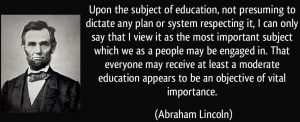This is a counter-punch to the opening arguments made 24 hours earlier by IIT Kharagpur
here
Why always a few represent all!
The paradigm of working with a sample rather than the population has always been in question. Now the question arises, why should this sample be skewed in nature, or should be tilted towards the well educated and graduate ones. The primary reason which comes to our mind is that, those should lead who are capable to do so, and they will usually be the ones who are all knowledgeable and understand the delicacies of running a system well. Usually they would belong to the category of educated, because you agree or not, but education helps in attaining wisdom at many levels, and helps us to guide others with this powerful tool.
The 9
th Class NCERT book says that some constituencies are reserved for SC/STs so that there is a fair representation from all the sections of our society. The important fact to be considered here is that, currently in the Lok Sabha, 79 seats are reserved for the Scheduled Castes and 41 for the Scheduled Tribes. These numbers are in proportion to their share in the total population. Now going by this fact, and the argument IIT Kharagpur made, in which their team said that 80% of the Indian population is not graduated. So do they mean to say that for these 80% of the people, 80% of the seats in the Lok Sabha should be reserved, so as to give them representation on the basis of their share in the total population? Otherwise things would remain unfair according to them. And if such a decision is ever made, what a chaos would it be across the country, we can’t even imagine.
“Although the context of the exercise was representation of SCs and STs, it was insightful enough to introduce a much broader concept that talks about representation of each stratum in society, including the less privileged non-graduates of our country.”
We are sure that our rival team members would have never voted for India’s most successful political party due to the fact that there is absolutely no representation from outside the most popular family for the post of party President, for past 3 continuous terms. A doubt also arises, whether our rivals are going to demand for undergraduates to be the Prime Minister (PM) of India (leave alone discussion on balancing for the 20% sample size of graduates). We wonder if there is a definite logic running behind the appointment of PM of India since all the PMs till date have been graduates (though there is no mention in any rule-book), but for the exception of Mr. H. D. Deve Gowda, a diploma holder, nicknamed “Sleeping Gowda” due to his habit of napping in Lok Sabha & other official functions, who held office just for 11 months.
Calling the non-graduates
“less privileged” would be an unfair statement, we suppose. This is because as the Merriam Webster dictionary defines the underprivileged as “deprived through social or economic condition of some of the fundamental rights of all members of a civilized society”; while this is no where the case with non-graduates, or even uneducated strata of the society. And many a times, graduation is a willful choice than being an attainment of some privilege over others.
“So, if we go by the idea of only a graduate for contesting elections, we will be limiting ourselves to a sample of about 20% for selecting representative and in this process miss out on a lot of other deserving candidates.”
Probably that is the reason behind the turmoil that Indian Political System is into. The parties give tickets even to individuals with criminal backgrounds just to balance out on those so called “deserving candidates”.
Redefining “Politicians”
We really liked the approach taken by the team from IIT Kharagpur, when they make everyone aware about the definitions present inside the world renowned dictionary, Merriam Webster. But we’d have appreciated it even more, had they been able to look two lines down, on the very same page, where Merriam Webster defines a politician as “a person primarily interested in political office for
selfish or other narrow usually short-sighted reasons”. This might not be the definition they were looking for, we suppose. But it rightly captures the essence of our premise that there are some people in our country who enter into the politics for their selfish interests, and since there are no entry barriers (minimum education criteria) for this particular job, so it is really difficult to filter out such candidates, who are neither educated, nor willing to serve the country in particular, but want to enter the politics to serve their own interests.
The history needs to be quoted
We are thankful to the IIT Kharagpur team to put forth the names of Abraham Lincoln, George Washington, Winston Churchill, who were all, the greatest politicians of their times, and not one was a graduate; but still each one of them supported the need for education in their respective times. That must be one of the reasons, why these intellectual minds have made the following remarks, when it comes to the need of education:

Source: http://izquotes.com
Source: http://thepeopleproject.com
Source: http://meetville.com
Where do we need educated, if not our parliament?
“You might need graduates for many different types of jobs, but politics is not one of them.”
It makes us wonder, what other job would need more qualifications, than running an entire country? The people, who sit at the highest levels, must be acquainted with full fledged degrees, so that they at least understand the technicalities of being a part of a formal system, and they well understand the working and functionalities of various associated departments within a system.
“As far as politicians go, all that is required is common sense and wisdom. No amount of education can ever span the chasm of lack of practical experience or lack of common sense.”
It makes us wonder why then policies to govern the country are formulated by officers of the stature of an IAS & not by politicians with plethora of wisdom. Arguably even common sense needs a base based on which decision can be made regarding what is right & wrong. It should not be a wild guess, at least not in politics.
“Going forward, we feel that politicians should be given requisite training before they assume their roles and responsibilities, similar to the training given in a corporate setting when a new hire is inducted. Irrespective of being a graduate, the person has to undergo a training pertaining to the role offered in the company.”
Do corporate companies hire undergraduates? Some of them do, but most of those jobs are repetitive in nature unlike Indian politics. We agree with our rival team that training of politicians, to make them aware of ground realities, should be incorporated in the system though. But just like corporate scenario, the hired people should already have an elementary knowledge so that the platform, to build upon pyramids of knowledge, is already there. Nevertheless, even to train our future politicians, we will need educated individuals at the top of the pyramid, and hence supporting our premise of graduation being mandatory for contesting elections.
Conclusion
We truly believe that one can’t ask someone else to do something, before doing it oneself. Leading by example is the best way one can devise to lead the society. Highly educated intellectuals can definitely make a commendable difference if supported by the common man, to lead the country at all levels.
References:
http://gradestack.com/CBSE-Class-9th/Reserved-Constituencies/14931-2957-3178-study-wtw
http://www.merriam-webster.com/dictionary/politician
http://www.nextpmindia.com/prime-ministers-of-india-from-1947-2014-photos-details/
Team Name: Voyagers
Team Members: Ketan Bagga, Varun Sharma



